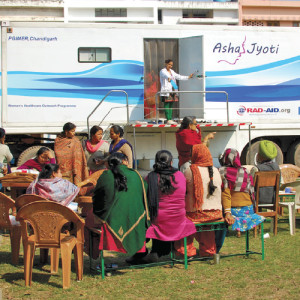
 Priya Yadav of Elets News Network (ENN) discusses in detail the ever-growing role of private players in the healthcare space. As a result of the active participation of private companies under the public-private partnership (PPP) model, Punjab has witnessed increased enhancement in the standard of healthcare services. With the objective to outsource healthcare services to private players where possible, Government of Punjab is actively collaborating with private companies to provide services, including infrastructure development, testing, screening facilities, etc.
Priya Yadav of Elets News Network (ENN) discusses in detail the ever-growing role of private players in the healthcare space. As a result of the active participation of private companies under the public-private partnership (PPP) model, Punjab has witnessed increased enhancement in the standard of healthcare services. With the objective to outsource healthcare services to private players where possible, Government of Punjab is actively collaborating with private companies to provide services, including infrastructure development, testing, screening facilities, etc.
Private players in the health domain have come to the rescue of the government in a variety of areas, especially those where the government set-up has not been able to raise its standard of delivery of health services. The beneficiary has been the common man, who now has the advantage of getting better health services rather than relying on governments notoriously poor health services. This is true not just in the remote and rural areas, but also in big cities where the government infrastructure in health sector falls far short of expectations.
Even as the state governments are making attempts to strengthen their infrastructure, there is an increasing dependency on private hospitals and diagnostic centres, which are increasingly partnering with the state governments for providing effective healthcare to people across all sections.

Cashless Health Insurance Schemes
Nearly a year ago, the Punjab Government took a decision to implement cashless health insurance scheme in lieu of the policy of reimbursement of the medical expenses. This decision of the state cabinet came as a boon for over 6.5 lakh employees and pensioners of the state government. The facility of cashless treatment is now provided to government employees, pensioners and their dependents in more than 250 empanelled public and private hospitals in Punjab, Chandigarh and NCR (Delhi, Gurgaon and Noida).
Under this scheme, all the benefits are granted to the employees according to Service Rules (Medical Attendance Rules 1940). The expenses on treatment if taken outside the state are reimbursed to the employees by the insurance company within 15 days of submission of medical claim. According to the scheme, the expenditure on treatment of patients admitted in hospital and 246 kinds of day care procedures, in which treatment is provided in less than 24 hours, and treatment of chronic diseases in an outpatient department (OPD) is provided to patients without spending any money.
 The OPD expenses other than those related to chronic diseases continue to be met through a fixed medical allowance. The scheme covers pre- and post-hospitalisation benefits up to 7 days and 30 days, respectively, which were not available under the prevailing rules. Though the insurance company cover was Rs 3 lakh per family; however, the scheme would cover a family for an unlimited amount. And, though the scheme was made compulsory to employees and pensioners, it was optional for All India Service Officers, serving and ex-MLAs, and serving and ex-Judges of Punjab and Haryana High Court.
The OPD expenses other than those related to chronic diseases continue to be met through a fixed medical allowance. The scheme covers pre- and post-hospitalisation benefits up to 7 days and 30 days, respectively, which were not available under the prevailing rules. Though the insurance company cover was Rs 3 lakh per family; however, the scheme would cover a family for an unlimited amount. And, though the scheme was made compulsory to employees and pensioners, it was optional for All India Service Officers, serving and ex-MLAs, and serving and ex-Judges of Punjab and Haryana High Court.
| Role of Private Players – Key Takeaways |
|
Following on the lines of the Punjab Government, the Haryana Government has recently approved the new empanelment policy of private hospitals under which medical reimbursement to the State Government employees, pensioners and their dependents will be allowed at Postgraduate Institute of Medical Education and Research (PGIMER), Chandigarh, rates along with 75 per cent of the balance amount is applicable to non-package procedures.
Under the new policy, multispeciality hospitals with minimum 100 beds and superspeciality and single speciality hospitals having minimum bed strength of 30 will be eligible for empanelment. To be empanelled, a hospital must possess an accreditation certificate of National Accreditation Board for Hospitals & Healthcare Providers or Joint Commission International.
The Government has after inspections notified the hospitals for empanelment that fulfilled the due criteria. Inspections were carried out by a Committee headed by Additional Director General Health Services or Director or Civil Surgeon as per the directions of the Director General Health Services with the specialists as members.
Public-Private Partnership (PPP)
In a state where cancer has spread like cancer, Punjab has relied massively on providing treatment through the PPP model. Two cancer hospitals have come up, one in Mohali and another in Bathinda with the help of Max Healthcare. Even as the Government has provided land at concessional costs, the private hospitals have been set up which will also give 5 per cent of gross turnover every year to the Government besides providing state-of-the-art treatment to people.
It is not just the state governments which are promoting partnership with private sector wherever possible, but also the Central Government which has come out with a policy on this. The idea is to outsource health services to private players where possible, thereby supplementing government funding with private investment and improving expenditure in the area.
The framework developed is to attract private partners to run subcentres and primary health centres under the National Rural Health Mission (NRHM), provide diagnostic facilities where possible, train human resources in health, and build hospitals and infrastructure. Even hospital cleanliness and waste management can be outsourced. This is already happening in certain prime hospitals like PGIMER Chandigarh where services like security, cleanliness and host of other services have been outsourced.
PPP models have been developed for NRHM services, medical education, human resource training and infrastructure augmentation. There is already private presence in the health sector with over 70 per cent medical colleges being private.
Collaborating with private companies is proving to be a boon even when it comes to detecting diseases, not just in treating them. Regions premier medical institute, PGIMER Chandigarh had joined hands with RAD-AID and Royal Philips Electronics limited and launched a 6-month pilot project under Asha Jyoti programme, where more than 500 women were screened for breast cancer, cervical cancer and osteoporosis in rural areas. In the project, nearly 50 per cent of the women seen were from the poorest socio-economic groups in India, living in households that earn less than Rs 60 per day, and the mobile unit provided an opportunity for free health screening on their doorstep.

 Asha Jyoti -Overview
Asha Jyoti -Overview
Asha Jyoti is a population-based screening programme for women aged between 40 and 60 years. It aims to ensure early detection of breast cancer, cervical cancer and osteoporosis, even before the individual has any signs or symptoms. It was established as a model for preventive healthcare for semi-urban and rural areas in northern India and involved in the creation of a special mobile outreach van with imaging technology and clinical referral services to efficiently and effectively address multiple care needs.
During the 6 month pilot phase, 615 women participated in the screening, and now that the programme is going into full operational phase the aim is to screen 2,000 to 3,000 women every year for at least the next 4 to 5 years and provide a clear plan for followup and further routine screening.
In addition to being a model for integrating womens health services, the collaboration is a unique public-private partnership between government (PGIMER) entities, non-profit non-government organisation (RAD-AID) and the private sector (Philips Healthcare). To make the Asha Jyoti programme work, PGIMER delivers the clinical services, RAD-AID is providing educational training and programme planning support to health workers and staff and Philips has donated all the equipment and also donated the entire van which was designed and built in India with local suppliers.
Overall, it is interesting to note how both public and private sector players are together making a powerful impact on the healthcare space. Isolated actions are definitely not going to solve the problems or fill the gaps present in the Indian healthcare space where maintenance of quality and standards remains an issue and can only be resolved through the active participation of private players.
Be a part of Elets Collaborative Initiatives. Join Us for Upcoming Events and explore business opportunities. Like us on Facebook , connect with us on LinkedIn and follow us on Twitter , Instagram.












